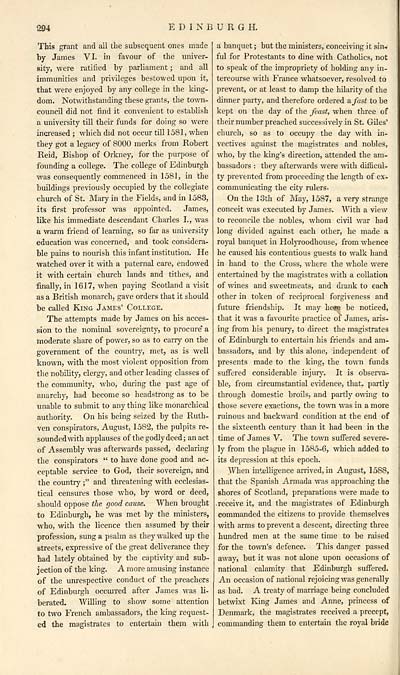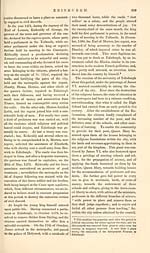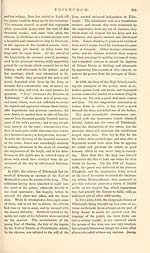Gazetteer of Scotland > Volume 1
(328) Page 294
Download files
Complete book:
Individual page:
Thumbnail gallery: Grid view | List view

EDINBURGH.
This grant and all the subsequent ones made
by James VI. in favour of the univer-
sity, were ratified by parliament ; and all
immunities and privileges bestowed upon it,
that were enjoyed by any college in the king-
dom. Notwithstanding these grants, the town-
council did not find it convenient to establish
a university till their funds for doing so were
increased ; which did not occur till 1581, when
they got a legacy of 8000 merks from Robert
Reid, Bishop of Orkney, for the purpose of
founding a college. The college of Edinburgh
was consequently commenced in 1581, in the
buildings previously occupied by the collegiate
church of St. Mary in the Fields, and in 1583,
its first professor was appointed. James,
like his immediate descendant Charles I., was
a warm friend of learning, so far as university
education was concerned, and took considera-
ble pains to nourish this infant institution. He
watched over it with a paternal care, endowed
it with certain church lands and tithes, and
finally, in 1617, when paying Scotland a visit
as a British monarch, gave orders that it should
be called King James' College.
The attempts made by James on his acces-
sion to the nominal sovereignty, to procure* a
moderate share of power, so as to carry on the
government of the country, met, as is well
known, with the most violent opposition from
the nobility, clergy, and other leading classes of
the community, who, during the past age of
anarchy, had become so headstrong as to be
unable to submit to any thing like monarchical
authority. On his being seized by the Ruth-
ven conspirators, August, 1582, the pulpits re-
sounded with applauses of the godly deed; an act
of Assembly was afterwards passed, declaring
the conspirators " to have done good and ac-
ceptable service to God, their sovereign, and
the country ;" and threatening with ecclesias-
tical censures those who, by word or deed,
should oppose the good cause. When brought
to Edinburgh, he was met by the ministers,
who, with the licence then assumed by their
profession, sung a psalm as they walked up the
streets, expressive of the great deliverance they
had lately obtained by the captivity and sub-
jection of the king. A more amusing instance
of the unrespective conduct of the preachers
of Edinburgh occurred after James was li-
berated. Willing to show some attention
to two French ambassadors, the king request-
ed the magistrates to entertain them with
a banquet; but the ministers, conceiving it sin-
ful for Protestants to dine with Catholics, not
to speak of the impropriety of holding any in-
tercourse with France whatsoever, resolved to
prevent, or at least to damp the hilarity of the
dinner party, and therefore ordered a fast to be
kept on the day of the feast, when three of
their number preached successively in St. Giles'
church, so as to occupy the day with in-
vectives against the magistrates and nobles,
who, by the king's direction, attended the am-
bassadors : they afterwards were with difficul-
ty prevented from proceeding the length of ex-
communicating the city rulers.
On the 13th of May, 1587, a very strange
conceit was executed by James. With a view
to reconcile the nobles, whom civil war had
long divided against each other, he made a
royal banquet in Holyroodhouse, from whence
he caused his contentious guests to walk hand
in hand to the Cross, where the whole were
entertained by the magistrates with a collation
of wines and sweetmeats, and drank to each
other in token of reciprocal forgiveness and
future friendship. It may hese be noticed,
that it was a favourite practice of James, aris-
ing from his penury, to direct the magistrates
of Edinburgh to entertain his friends and am-
bassadors, and by this alone, independent of
presents made to the king, the town funds
suffered considerable injury. It is observa-
ble, from circumstantial evidence, that, partly
through domestic broils, and partly owing to
those severe exactions, the town was in a more
ruinous and backward condition at the end of
the sixteenth century than it had been in the
time of James V. The town suffered severe-
ly from the plague in 1585-6, which added to
its depression at this epoch.
When intelligence arrived, in August, 1588,
that the Spanish Armada was approaching the
shores of Scotland, preparations were made to
• receive it, and the magistrates of Edinburgh
commanded the citizens to provide themselves
with arms to prevent a descent, directing three
hundred men at the same time to be raised
for the town's defence. This danger passed
away, but it was not alone upon occasions of
national calamity that Edinburgh suffered.
An occasion of national rejoicing was generally
as bad. A treaty of marriage being concluded
betwixt King James and Anne, princess of
Denmark, the magistrates received a precept,
commanding them to entertain the royal bride
This grant and all the subsequent ones made
by James VI. in favour of the univer-
sity, were ratified by parliament ; and all
immunities and privileges bestowed upon it,
that were enjoyed by any college in the king-
dom. Notwithstanding these grants, the town-
council did not find it convenient to establish
a university till their funds for doing so were
increased ; which did not occur till 1581, when
they got a legacy of 8000 merks from Robert
Reid, Bishop of Orkney, for the purpose of
founding a college. The college of Edinburgh
was consequently commenced in 1581, in the
buildings previously occupied by the collegiate
church of St. Mary in the Fields, and in 1583,
its first professor was appointed. James,
like his immediate descendant Charles I., was
a warm friend of learning, so far as university
education was concerned, and took considera-
ble pains to nourish this infant institution. He
watched over it with a paternal care, endowed
it with certain church lands and tithes, and
finally, in 1617, when paying Scotland a visit
as a British monarch, gave orders that it should
be called King James' College.
The attempts made by James on his acces-
sion to the nominal sovereignty, to procure* a
moderate share of power, so as to carry on the
government of the country, met, as is well
known, with the most violent opposition from
the nobility, clergy, and other leading classes of
the community, who, during the past age of
anarchy, had become so headstrong as to be
unable to submit to any thing like monarchical
authority. On his being seized by the Ruth-
ven conspirators, August, 1582, the pulpits re-
sounded with applauses of the godly deed; an act
of Assembly was afterwards passed, declaring
the conspirators " to have done good and ac-
ceptable service to God, their sovereign, and
the country ;" and threatening with ecclesias-
tical censures those who, by word or deed,
should oppose the good cause. When brought
to Edinburgh, he was met by the ministers,
who, with the licence then assumed by their
profession, sung a psalm as they walked up the
streets, expressive of the great deliverance they
had lately obtained by the captivity and sub-
jection of the king. A more amusing instance
of the unrespective conduct of the preachers
of Edinburgh occurred after James was li-
berated. Willing to show some attention
to two French ambassadors, the king request-
ed the magistrates to entertain them with
a banquet; but the ministers, conceiving it sin-
ful for Protestants to dine with Catholics, not
to speak of the impropriety of holding any in-
tercourse with France whatsoever, resolved to
prevent, or at least to damp the hilarity of the
dinner party, and therefore ordered a fast to be
kept on the day of the feast, when three of
their number preached successively in St. Giles'
church, so as to occupy the day with in-
vectives against the magistrates and nobles,
who, by the king's direction, attended the am-
bassadors : they afterwards were with difficul-
ty prevented from proceeding the length of ex-
communicating the city rulers.
On the 13th of May, 1587, a very strange
conceit was executed by James. With a view
to reconcile the nobles, whom civil war had
long divided against each other, he made a
royal banquet in Holyroodhouse, from whence
he caused his contentious guests to walk hand
in hand to the Cross, where the whole were
entertained by the magistrates with a collation
of wines and sweetmeats, and drank to each
other in token of reciprocal forgiveness and
future friendship. It may hese be noticed,
that it was a favourite practice of James, aris-
ing from his penury, to direct the magistrates
of Edinburgh to entertain his friends and am-
bassadors, and by this alone, independent of
presents made to the king, the town funds
suffered considerable injury. It is observa-
ble, from circumstantial evidence, that, partly
through domestic broils, and partly owing to
those severe exactions, the town was in a more
ruinous and backward condition at the end of
the sixteenth century than it had been in the
time of James V. The town suffered severe-
ly from the plague in 1585-6, which added to
its depression at this epoch.
When intelligence arrived, in August, 1588,
that the Spanish Armada was approaching the
shores of Scotland, preparations were made to
• receive it, and the magistrates of Edinburgh
commanded the citizens to provide themselves
with arms to prevent a descent, directing three
hundred men at the same time to be raised
for the town's defence. This danger passed
away, but it was not alone upon occasions of
national calamity that Edinburgh suffered.
An occasion of national rejoicing was generally
as bad. A treaty of marriage being concluded
betwixt King James and Anne, princess of
Denmark, the magistrates received a precept,
commanding them to entertain the royal bride
Set display mode to: Large image | Transcription
Images and transcriptions on this page, including medium image downloads, may be used under the Creative Commons Attribution 4.0 International Licence unless otherwise stated. ![]()
| Gazetteers of Scotland, 1803-1901 > Gazetteer of Scotland > Volume 1 > (328) Page 294 |
|---|
| Permanent URL | https://digital.nls.uk/97428298 |
|---|
| Description | Volume I: Abbey to Glenartney. |
|---|---|
| Attribution and copyright: |
|
| Description | By Robert Chambers and William Chambers. Glasgow: Blackie & Son, 1838. 2 volumes. |
|---|---|
| Shelfmark | NF.1461.g.7 |
| Additional NLS resources: | |

